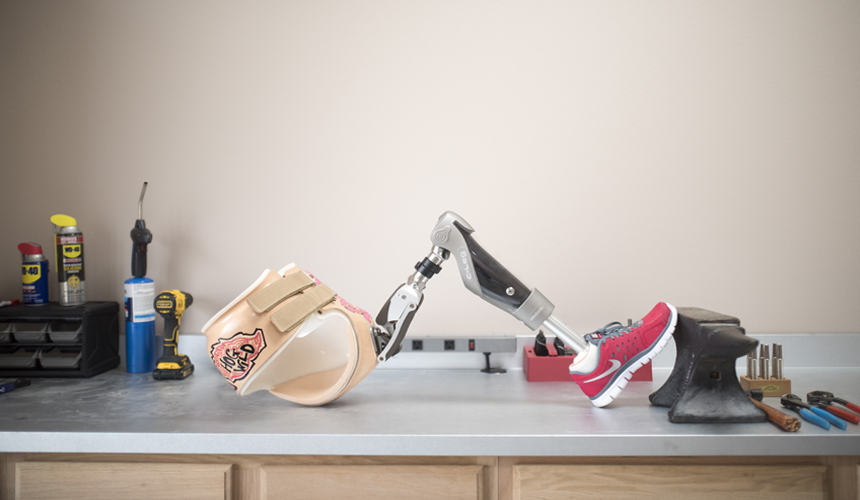When you choose a new doctor or dentist, you likely do quite a bit of homework. You may ask around for recommendations, check reviews, or call in to see what type of customer service you receive. When you are in need of a custom prosthesis, the same careful and critical vetting process should take place. Keep reading to learn what key factors to look for when choosing the best custom prosthetics company and prosthetist for you.
Why it is important to go through a vetting process
You should think of the relationship with your prosthetist as a long-term investment in your prosthetic care. Whether you are preparing for amputation surgery, are a new amputee, or are looking for a new prosthetist, you should not take the selection of a custom prothetic process lightly. If you are still in the hospital, you can ask your doctor to arrange for multiple specialists from different prosthetic companies to meet with you—sometimes even before surgery. Of all the staff you will see during a hospital visit for this type of surgery, your prosthetist is the one you will continue to see the most after discharge.
Throughout the amputation and prosthesis preparation process, you will have a lot to consider and work through mentally and emotionally. Choosing the right prosthetics company and prosthetist can help you navigate one of the most important of these factors: it can help you get back to your normal lifestyle.
What to look for in a prosthetics company and prosthetist
- Check credentials.
A prosthetist should have a degree and certification, which is often on display on their website or in the office. If credentials are not readily available, you can ask for a copy. - Find an office whose location is convenient for you.
You may need to take several trips to the prosthetist’s office during the fitting stage. Finding a location that is close to your home or office can simplify this process for you. - Join a support group and ask for feedback.
The Amputee Coalition can provide a list of local support groups available in your area. You can create a post in a Facebook group asking for recommendations and what others’ experiences have been with the local companies. - Check reviews.
In this modern era, reviews are all-telling. If customers have had extremely good or bad experiences, it is highly possible that they have shared them online. Check reviews on Google, Yelp, and Facebook to see what others’ experiences were when choosing a particular prosthetics company. If there is a bad review, make your own assessment of its trustworthiness, and look for a reply from the business owner. Consider whether the owner attempted to remedy the situation in a way that matches your expectations. - Call the office.
You can spend hours online trying to get an impression of a potential company, but calling to ask for more information will give you a much better sense of how the business operates. Do they sound friendly and welcoming over the phone? Do they take the time to listen to and answer all of your questions? Do they invite you in for a complimentary consultation? The answers to these questions may predict your overall experience with the company, should you choose to work with them in the long term. - Gather all your questions and meet with your prosthetist.
You can typically set up a complimentary consultation to get to know a potential prosthetist and let them share their expectations for the customization process. Have any and all questions prepared to ensure you leave feeling confident in your decision. During this conversation, note whether you feel comfortable enough to voice your opinions and communicate your needs and questions to the prosthetist, as these can arise frequently throughout your time working with them. - Take someone with you to the meeting for a second opinion.
Have a trusted friend or relative join you for the consultation. This provides a means for another person to hear all that is being said, which can help you in making your decision by ensuring you do not miss any important information. After your visit, you can discuss your impressions of the company with this trusted person and get their opinion. - Ask about the use of modern technology.
Advancements in the technology used for prosthetics can provide positive outcomes for amputees. Find out what technologies are available for your specific needs, and discuss whether this can be a part of your custom prosthetic development from the beginning. For example, due to the lower costs of less advanced prosthetics, some prosthetists may want to start with lesser technology options and upgrade to more advanced options later. This is not always a sound strategy, however, since starting with one type and attempting to change later can create a need to unlearn bad habits. Ensure that the prosthetist you choose to work with is willing to find the most up-to-date technology available for your needs. - Ask how they can help with cost coverage.
Some of the more advanced technologies may come with a higher price point. Talk to your potential prosthetist about your options, and see what guidance they can provide to help you get the costs covered. - Once you have decided on the best prosthetist for you, make the most of your relationship.
If you have any concerns, such as issues with comfort or fitting, contact your prosthetist right away. You should address any problems immediately so that you can focus on getting all the benefits from your prosthesis to complement your lifestyle.
At Horton’s Orthotics and Prosthetics, we would love to be your ideal prosthetics provider. Call us at 501-663-2908, or contact us for a free consultation with one of our highly-trained professional prosthetists. We are dedicated to helping you get your life back, and we have made lifetime support and quality service to our patients our top priority since 1981. Give us a call today!



